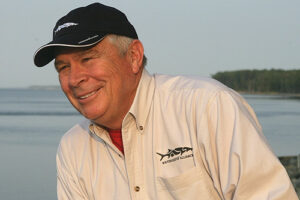Rick Dove
40 Years, 40 Stories

RICK DOVE, NEW BERN
“As a kid, I always wanted to be fisherman, but my mother and father talked me out of it,” said Rick Dove.
Dove got his chance, however, after earning a law degree, then getting a draft notice for Vietnam that resulted in a 20-plus-year career in the U.S. Marine Corps.
“I came here in 1975; the Marine Corps brought me here. When I walked out the gate for the last time, I traded my spit-shined shoes and put on the dirtiest clothes I could find and became a commercial fisherman,” Dove said. “Things were great until about 1990.”
That’s when the catch from the Neuse became riddled with sores; Dove and his son, Todd, who fished with him, had them too.
“I wouldn’t eat the fish, so I decided couldn’t sell them either,” Dove said.
Dove hung up his dirtiest clothes, went back to practicing law and found a new calling when he was hired as the Neuse Riverkeeper at the behest of early Neuse River Foundation board member Grace Evans. At that point, NRF had been successful in its bid for a statewide ban on cleaning products containing phosphorous, which entered the waterways through sewage treatment plants, much to the detriment of aquatic life, but NRF wanted to do more.
When Dove came aboard, he put his law degree to use again, this time going after those polluting the river, directly.
“We sued wastewater treatment plants and hog farms. Our docket had 20 cases on it, all the time. We were in court a good bit of the time, but most of our cases were settled out of court,” Dove said.
Neuse River Foundation grew from 70 members to more than 2,000. The Neuse River had gotten a bad reputation, devastating both tourism and the housing market, and disparate interests banded together to do something about it. Hundreds of volunteers patrolled and sampled the waters at stations from the lower Neuse up to Raleigh, and local pilots volunteered their planes to get a bird’s-eye view of pollution sources. A designated force of creek-keepers took an active role in tracking salinity, turbidity and oxygen levels in tributaries.
“It was a very active time in the ’90s. We got pretty good results with all the screaming and yelling we were doing about the health of the river,” Dove said.
Results included injunctions against industrial hog farms and EPA payouts to clean up rivers, as well as the creation of pollution-reducing rules by the state that were put in place for the Neuse River Basin in 1997.
But deep budgets cuts to North Carolina’s Department of Environmental Quality over the years, has meant watching over the waterways and doing much of the work necessary to keep rivers swimmable, fishable and drinkable has fallen to organizations such as Sound Rivers.
“If it’s going to get fixed, it’s going to be fixed by the waterkeepers. There’s nobody else out there doing the work. The rivers are screaming because they’re out of balance with nutrients, and when nature goes out of balance, it comes back with things like fish kills,” Dove said, referring to a month-long fish kill on the Neuse this fall that brought public concern to a level not seen in years. “I’d like to see us get back to what we used to do. We need to get tough again. Somehow, we need to get the message out to the public forum. We don’t have to be all negative, but we certainly have to speak for the river in ways that are honest or strong. You can’t compromise the river to support pollution. You just can’t.”
